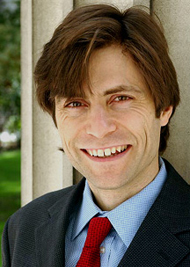 Most readers will doubtless be familiar with Max Tegmark, the MIT cosmologist who successfully balances down-and-dirty data analysis of large-scale structure and the microwave background with more speculative big-picture ideas about quantum mechanics and the nature of reality. Max has a new book out — Our Mathematical Universe: My Quest for the Ultimate Nature of Reality — in which he takes the reader on a journey from atoms and the solar system to a many-layered multiverse.
Most readers will doubtless be familiar with Max Tegmark, the MIT cosmologist who successfully balances down-and-dirty data analysis of large-scale structure and the microwave background with more speculative big-picture ideas about quantum mechanics and the nature of reality. Max has a new book out — Our Mathematical Universe: My Quest for the Ultimate Nature of Reality — in which he takes the reader on a journey from atoms and the solar system to a many-layered multiverse.
In the wake of the recent results indicating gravitational waves in the cosmic microwave background, here Max delves into the idea of inflation — what it really does, and what some of the implications are.
Thanks to the relentless efforts of the BICEP2 team during balmy -100F half-year-long nights at the South Pole, inflation has for the first time become not only something economists worry about, but also a theory for our cosmic origins that’s really hard to dismiss. As Sean has reported here on this blog, the implications are huge. Of course we need independent confirmation of the BICEP2 results before uncorking the champagne, but in the mean time, we’re forced to take quite seriously that everything in our observable universe was once smaller than a billionth the size of a proton, containing less mass than an apple, and doubled its size at least 80 times, once every hundredth of a trillionth of a trillionth of a trillionth of a second, until it was more massive than our entire observable universe.
We still don’t know what, if anything, came before inflation, but this is nonetheless a huge step forward in understanding our cosmic origins. Without inflation, we had to explain why there were over a million trillion trillion trillion trillion kilograms of stuff in existence, carefully arranged to be almost perfectly uniform while flying apart at huge speeds that were fine-tuned to 24 decimal places. The traditional answer in the textbooks was that we had no clue why things started out this way, and should simply assume it. Inflation puts the “bang” into our Big Bang by providing a physical mechanism for creating all those kilograms and even explains why they were expanding in such a special way. The amount of mass needed to get inflation started is less than that in an apple, so even though inflation doesn’t explain the origin of everything, there’s a lot less stuff left to explain the origin of.
If we take inflation seriously, then we need to stop saying that inflation happened shortly after our Big Bang, because it happened before it, creating it. It is inappropriate to define our Hot Big Bang as the beginning of time, because we don’t know whether time actually had a beginning, and because the early stages of inflation were neither strikingly hot nor big nor much of a bang. As that tiny speck of inflating substance doubled its diameter 80 times, the velocities with which its parts were flying away from one another increased by the same factor 2^80. Its volume increased by that factor cubed, i.e., 2^240, and so did its mass, since its density remained approximately constant. The temperature of any particles left over from before inflation soon dropped to near zero, with the only remaining heat coming from same Hawking/Unruh quantum fluctuations that generated the gravitational waves.
Taken together, this in my opinion means that the early stages of inflation are better thought of not as a Hot Big Bang but as a Cold Little Swoosh, because at that time our universe was not that hot (getting a thousand times hotter once inflation ended), not that big (less massive than an apple and less than a billionth of the size of a proton) and not much of a bang (with expansion velocities a trillion trillion times slower than after inflation). In other words, a Hot Big Bang did not precede and cause inflation. Instead, a Cold Little Swoosh preceded and caused our Hot Big Bang.
Since the BICEP2 breakthrough is generating such huge interest in inflation, I’ve decided to post my entire book chapter on inflation here so that you can get an up-to-date and self-contained account of what it’s all about. Here are some of the questions answered:
- What does the theory of inflation really predict?
- What physics does it assume?
- Doesn’t creation of the matter around us from almost nothing violate energy conservation?
- How could an infinite space get created in a finite time?
- How is this linked to the BICEP2 signal?
- What remarkable prize did Alan Guth win in 2005?
Pingback: Dudas sobre el descubrimiento que confirmaría la inflación cósmica |